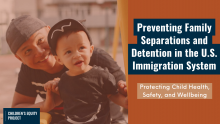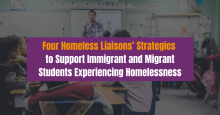0
Policy Brief
Community:
Mar 28, 2023
Family separations and family detention have been used as part of immigration enforcement in the United States. These practices and policies are severely detrimental to child health and wellbeing and can cause lasting harm.
This brief reviews the state of the research on the developmental, psychological, and physical toll of family separation and family detention on children and their caregivers. Grounded in this science, we provide a set of policy recommendations that protect child health and wellbeing.
Authored by: Kelly Edyburn, PhD & Shantel Meek, PhD for the Children's Equity Project
Topics: Child welfare, Early childhood, Health, Immigrants, Legislation & Policy, Mental health, Youth
 Shared by Sandra Ware
Shared by Sandra Ware
Sandra Ware posted a
on Mar 30, 2023
Kelly Edyburn, PhD & Shantel Meek, PhD for the Children's Equity Project
Family separations and family detention have been used as part of immigration enforcement in the United States.
0
Publication
Community:
Mar 2, 2023
Many students and families arrive in the U.S. from other countries without safe, stable housing, and experience homelessness and high mobility that can last for months. At SchoolHouse Connection, we recognize the crucial role that schools can play in providing stability and support to mitigate the disruption and trauma caused by homelessness. This page is dedicated to providing educators, policymakers, and advocates with valuable resources on how to best support these families and youth, and help ensure that all students have the opportunity to succeed in school and beyond.
Authored by: School House Connection
Topics: Early childhood, Education, Grade-level proficiency, Homelessness, Housing, Immigrants, Legislation & Policy, School-readiness, Youth
 Shared by Sandra Ware
Shared by Sandra Ware
Sandra Ware posted a
on Mar 14, 2023
Many students and families arrive in the U.S. from other countries without safe, stable housing, and experience homelessness and high mobility that can last for months.
0
Interactive
Community:
Jan 24, 2023
Join us for an interactive course that explores practical, strength-based ways providers and other caring community members can help support children and families affected by conflict, crisis, or other traumatic experiences. This course can be taken as the first steps of support for newcomer families in your community.
Authored by: Sesame Street Communities
Topics: Early childhood, Family engagement, Healthy homes, Immigrants, Mental health, Youth
 Shared by Sandra Ware
Shared by Sandra Ware
Sandra Ware posted a
on Jan 24, 2023
Sesame Street Communities
Join us for an interactive course that explores practical, strength-based ways providers and other caring community members can help support children and families affected by conflict, crisis, or other traumatic experiences.
0
Publication
Community:
Aug 26, 2021
The National CLAS Standards are intended to advance health equity, improve quality, and help eliminate health care disparities by establishing a blueprint for health and health care organizations
Authored by: Think Cultural Health, an initiative of the Office of Minority Health, U.S. Department of Health & Human Services.
Topics: Communications, Health, Immigrants
 Shared by Camille Anoll-Hunter
Shared by Camille Anoll-Hunter
Camille Anoll-Hunter posted a
on Aug 26, 2021
Think Cultural Health, an initiative of the Office of Minority Health, U.S. Department of Health & Human Services.
The National CLAS Standards are intended to advance health equity, improve quality, and help eliminate health care disparities by establishing a blueprint for health and health care organizations
0
Infographics
Community:
Breakdown by state
Authored by: Center on Budget and Policy Priorities
Topics: Homelessness, Housing, Immigrants, Legislation & Policy
 Shared by Housing Is
Shared by Housing Is
Housing Is posted a
on Jun 7, 2019
Center on Budget and Policy Priorities
0
Communications
Community:
Consider using the following tweets and images during the Thursday, May 16, 3:00 pm ET tweetstorm. Continue to periodically share these posts on social media until the July 9, 2019 comment deadline.
Authored by: National Low Income Housing Coalition
Topics: Homelessness, Housing, Immigrants, Legislation & Policy
 Shared by Housing Is
Shared by Housing Is
Housing Is posted a
on Jun 7, 2019
National Low Income Housing Coalition
Consider using the following tweets and images during the Thursday, May 16, 3:00 pm ET tweetstorm. Continue to periodically share these posts on social media until the July 9, 2019 comment deadline.
0
Policy Brief
Community:
May 10, 2019
Policies such as those outlined in the draft proposed rule are having, and will continue to have a significant detrimental impact on survivors of domestic violence and sexual assault by deterring immigrant families, including those with U.S. citizen and Lawful Permanent Resident children, from accessing critical help when they need it. Housing assistance is a vital resource for survivors, giving them the security they need to leave abuse without having to fear that doing so will result in homelessness, as well as providing a safe environment to begin their recovery.
Authored by: Grace Huang for the Asian Pacific Institute on Gender-Based Violence
Topics: Domestic violence, Homelessness, Housing, Immigrants, Legislation & Policy
 Shared by Housing Is
Shared by Housing Is
Housing Is posted a
on Jun 7, 2019
Grace Huang for the Asian Pacific Institute on Gender-Based Violence
Policies such as those outlined in the draft proposed rule are having, and will continue to have a significant detrimental impact on survivors of domestic violence and sexual assault by deterring immigrant families, including those with U.S.
0
Policy Brief
Community:
On May 10, 2019, the Department of Housing and Urban Development (HUD) proposed a rule that would significantly change the agency’s eligibility requirements for federal housing assistance based on immigration status.
Authored by: National Housing Law Project and National Low Income Housing Coalition
Topics: Housing, Immigrants, Legislation & Policy
 Shared by Housing Is
Shared by Housing Is
Housing Is posted a
on Jun 7, 2019
National Housing Law Project and National Low Income Housing Coalition
On May 10, 2019, the Department of Housing and Urban Development (HUD) proposed a rule that would significantly change the agency’s eligibility requirements for federal housing assistance based on immigration status.
0
Communications
Community:
On May 10, 2019, the U.S. Department of Housing and Urban Development (HUD) published a proposed rule that would prohibit “mixed-status" families from living in public and other subsidized housing. Mixed-status families are households that include both members who are eligible and ineligible for housing assistance based on their immigration status. Both statute and regulation allow families to live together in subsidized housing even if one family member is ineligible so long as the housing subsidy is decreased to exclude the ineligible person from the assistance. Importantly, just because a household member is an “ineligible” immigrant, it doesn’t mean that they are undocumented. Immigrants can have legal status and still not be eligible for public housing and Section 8 programs.
Authored by: National Low Income Housing Coalition and National Housing Law Project
Topics: Homelessness, Housing, Immigrants, Legislation & Policy, Low-income
 Shared by Housing Is
Shared by Housing Is
Housing Is posted a
on May 15, 2019
National Low Income Housing Coalition and National Housing Law Project
On May 10, 2019, the U.S. Department of Housing and Urban Development (HUD) published a proposed rule that would prohibit “mixed-status" families from living in public and other subsidized housing.
0
Communications
Community:
May 10, 2019
The U.S. Department of Housing and Urban Development (HUD) today published a proposed rule that would prohibit “mixed status families” from living in public and other subsidized housing. Mixed status families are households that include members who are eligible and others who are ineligible for housing assistance based on their immigration status. Currently, HUD allows families to live together in subsidized housing even if one family member is ineligible so long as the housing subsidy is prorated to exclude the ineligible person from the assistance. Importantly, just because a household member is an “ineligible” immigrant, it doesn’t mean that they are undocumented. Immigrants can have legal status and still not be eligible to receive housing assistance.
Authored by: National Low Income Housing Coalition
Topics: Housing, Immigrants, Legislation & Policy
 Shared by Housing Is
Shared by Housing Is
Housing Is posted a
on May 10, 2019
National Low Income Housing Coalition
The U.S. Department of Housing and Urban Development (HUD) today published a proposed rule that would prohibit “mixed status families” from living in public and other subsidized housing.
0
News Article
Community:
May 10, 2019
The Department of Housing and Urban Development acknowledged that a Trump administration plan to purge undocumented immigrants from public housing could displace more than 55,000 children, all of whom are legal U.S. residents or citizens.
Authored by: Tracy Jan for The Washington Post
Topics: Housing, Immigrants, Legislation & Policy
 Shared by Housing Is
Shared by Housing Is
Housing Is posted a
on May 10, 2019
Tracy Jan for The Washington Post
The Department of Housing and Urban Development acknowledged that a Trump administration plan to purge undocumented immigrants from public housing could displace more than 55,000 children, all of whom are legal U.S. residents or citizens.
0
Report
Community:
Apr 1, 2019
This much-needed, thorough review of the existing scholarship on what is known (and still unknown) about the relationship between residential segregation and various outcomes for immigrants, is an important foundation on which to build inclusive, equitable housing and school policies.
Authored by: Martha Cecilia Bottia for Poverty and Race Research Action Council
Topics: Child welfare, Housing, Immigrants, Research
 Shared by Housing Is
Shared by Housing Is
Housing Is posted a
on May 10, 2019
Martha Cecilia Bottia for Poverty and Race Research Action Council
This much-needed, thorough review of the existing scholarship on what is known (and still unknown) about the relationship between residential segregation and various outcomes for immigrants, is an important foundation on which to build inclusive, equitable housing and school policies.
0
News Article
Community:
Apr 17, 2019
The Trump administration proposed a rule on Wednesday night intended to prevent undocumented immigrants from receiving federal housing assistance, the latest step in its efforts to ramp up enforcement of the nation’s immigration laws.
Authored by: Annie Karni and Michael D. Shear for The New York Times
Topics: Housing, Immigrants, Legislation & Policy
 Shared by Mica O'Brien
Shared by Mica O'Brien
Mica O'Brien posted a
on Apr 18, 2019
Annie Karni and Michael D. Shear for The New York Times
The Trump administration proposed a rule on Wednesday night intended to prevent undocumented immigrants from receiving federal housing assistance, the latest step in its efforts to ramp up enforcement of the nation’s immigration laws.
0
News Article
Community:
Feb 28, 2019
Child poverty in the U.S. could be cut in half over the next 10 years with a few simple steps, according to a new report from the National Academies of Sciences, Engineering and Medicine. The cost would be high — at least $90 billion a year. But the National Academies report warns that the price of not doing anything would be far greater.
Authored by: Pam Fessler for NPR
Topics: Child welfare, Criminal justice, Early childhood, Education, Food insecurity, Funding, Health, Immigrants, Legislation & Policy, Low-income, Nutrition, Racial inequalities
 Shared by Housing Is
Shared by Housing Is
Housing Is posted a
on Mar 12, 2019
Child poverty in the U.S. could be cut in half over the next 10 years with a few simple steps, according to a new report from the National Academies of Sciences, Engineering and Medicine. The cost would be high — at least $90 billion a year.
0
Publication
Community:
Jan 24, 2019
Affordable housing campaigns are not new, of course, but what is unprecedented and transformative about Opportunity Starts at Home is the scope and diversity of the partners that are joining forces to advocate for more robust and equitable federal housing policies. The campaign is advised by a Steering Committee including leading national organizations representing a wide range of interests that are working shoulder-to-shoulder to solve the affordable housing crisis.
Authored by: Opportunity Starts at Home
Topics: Asset building, Child welfare, CLPHA, Community development, Early childhood, Education, Food insecurity, Funding, Health, Homelessness, Housing, Immigrants, Legislation & Policy, Low-income, Mobility, Out-of-school time, Partnerships, Racial inequalities, Safety, Seniors, Stability, Substance abuse, Youth
 Shared by Mica O'Brien
Shared by Mica O'Brien
Mica O'Brien posted a
on Jan 24, 2019
Opportunity Starts at Home
Affordable housing campaigns are not new, of course, but what is unprecedented and transformative about Opportunity Starts at Home is the scope and diversity of the partners that are joining forces to advocate for more robust and equitable federal housing policies.
0
Research
Community:
Jan 16, 2019
This study explores the different ways undocumented status is associated with residential decisions and its implications on residential segregation. Drawing on 47 interviews with 20 undocumented-headed Mexican households in Dallas County, Texas, researchers examine the drivers of residential decisionmaking and illustrate the complex trade-offs undocumented households make between neighborhood quality and legal risk.
Authored by: How Housing Matters, Asad L. Asad and Eva Rosen for the Journal of Ethnic and Migration Studies
Topics: Housing, Immigrants, Legislation & Policy, Low-income, Mobility, Racial inequalities, South
 Shared by Housing Is
Shared by Housing Is
Housing Is posted a
on Jan 17, 2019
How Housing Matters, Asad L. Asad and Eva Rosen for the Journal of Ethnic and Migration Studies
This study explores the different ways undocumented status is associated with residential decisions and its implications on residential segregation.
0
Publication
Community:
Dec 6, 2018
The administration has proposed an expansion of the “public charge” rule that would make it more difficult for applicants whom officials deem likely to rely on public assistance to obtain lawful permanent residence (a “green card”) or a temporary visa. Among other changes, the rule would expand public charge determinations to include an applicant’s enrollment in the Medicaid program. Adding Medicaid to the list of public charge benefits that would be considered may force immigrants to choose between health insurance coverage and a future green card—with adverse consequences for parents and their children.
Authored by: Emily M. Johnston, Genevieve M. Kenney, and Jennifer M. Haley for The Urban Institute
Topics: Affordable Care Act, Health, Housing, Immigrants, Legislation & Policy, Medicaid / Medicare, Safety
 Shared by Mica O'Brien
Shared by Mica O'Brien
Mica O'Brien posted a
on Dec 6, 2018
Emily M. Johnston, Genevieve M. Kenney, and Jennifer M. Haley for The Urban Institute
The administration has proposed an expansion of the “public charge” rule that would make it more difficult for applicants whom officials deem likely to rely on public assistance to obtain lawful permanent residence (a “green card”) or a temporary visa.
0
Publication
Community:
Resources and presentation slides
Authored by: Food Research & Action Center
Topics: Food insecurity, Housing, Immigrants, Legislation & Policy
 Shared by Mica O'Brien
Shared by Mica O'Brien
Mica O'Brien posted a
on Nov 15, 2018
Food Research & Action Center
Resources and presentation slides
0
Policy Brief
Community:
Nov 5, 2018
The potential impacts of expanding the regulation known as “public charge” have yet to be fully understood, but experts anticipate that young children in immigrant families—more than 90 percent of them US citizens—could be disproportionately affected. The proposed rule could make it more difficult for noncitizens to obtain green cards or temporary visas by negatively weighing several factors during the immigration admissions process, including current or potential participation in safety net programs such as Medicaid and the Supplemental Nutrition Assistance Program.
Authored by: Erica Greenberg and Archana Pyati for The Urban Institute
Topics: Child welfare, Early childhood, Education, Food insecurity, Housing, Immigrants, Legislation & Policy, Low-income
 Shared by Mica O'Brien
Shared by Mica O'Brien
Mica O'Brien posted a
on Nov 5, 2018
Erica Greenberg and Archana Pyati for The Urban Institute
The potential impacts of expanding the regulation known as “public charge” have yet to be fully understood, but experts anticipate that young children in immigrant families—more than 90 percent of them US citizens—could be disproportionately affected.
0
Research
Community:
Oct 11, 2018
Public preschool programs are one way state and local governments can support immigrant children and families. We estimate that opening preschool to all children who speak languages other than English at home would lead to 3,200 new low-income preschoolers (from those already eligible) and up to 92,000 additional enrollees (from those newly eligible).
Authored by: Erica Greenberg, Victoria Rosenboom, Hamutal Bernstein for Urban Institute
Topics: Early childhood, Education, Immigrants, Low-income, Metrics, Research
 Shared by Mica O'Brien
Shared by Mica O'Brien
Mica O'Brien posted a
on Oct 11, 2018
Erica Greenberg, Victoria Rosenboom, Hamutal Bernstein for Urban Institute
Public preschool programs are one way state and local governments can support immigrant children and families.
0
Research
Community:
Oct 4, 2018
Housing providers and counselors in urban, suburban, and rural areas can help refugees and resettlement agencies navigate challenging rental markets, understand the evidence about how housing and neighborhoods matter, and prepare for long-term success as a renter or owner.
Authored by: Brianne Casey, Kimberly Burrowes, and Maya Brennan for Urban Institute
Topics: Community development, Housing, Immigrants, Research, Stability
 Shared by Mica O'Brien
Shared by Mica O'Brien
Mica O'Brien posted a
on Oct 4, 2018
Brianne Casey, Kimberly Burrowes, and Maya Brennan for Urban Institute
Housing providers and counselors in urban, suburban, and rural areas can help refugees and resettlement agencies navigate challenging rental markets, understand the evidence about how housing and neighborhoods matter, and prepare for long-term success as a renter or owner.
0
News Article
Community:
Sep 22, 2018
For the Omaha refugee families removed from an apartment complex where city inspectors found gas leaks, vermin and other code violations, there were glimmers of progress Friday amid the uncertainty.
Authored by: Erin Duffy for the Omaha World Herald
Topics: Health, Housing, Immigrants, Low-income, Midwest, Safety
 Shared by Mica O'Brien
Shared by Mica O'Brien
Mica O'Brien posted a
on Sep 27, 2018
Erin Duffy for the Omaha World Herald
For the Omaha refugee families removed from an apartment complex where city inspectors found gas leaks, vermin and other code violations, there were glimmers of progress Friday amid the uncertainty.
0
Policy Brief
Community:
Aug 9, 2018
Federal rules on immigrant youth and families are changing rapidly, from Deferred Action for Childhood Arrivals (DACA) to Temporary Protected Status (TPS). This brief provides basic information about eligibility for education services, and practical suggestions for schools.
Authored by: ScoolHouse Connection
Topics: Child welfare, Education, Immigrants, Legislation & Policy
 Shared by Housing Is
Shared by Housing Is
Housing Is posted a
on Aug 9, 2018
Federal rules on immigrant youth and families are changing rapidly, from Deferred Action for Childhood Arrivals (DACA) to Temporary Protected Status (TPS). This brief provides basic information about eligibility for education services, and practical suggestions for schools.
0
Report
Community:
Jul 18, 2018
This Issue Brief provides an update on the beneficiary experience in the first two demonstrations that were implemented as part of the Centers for Medicare & Medicaid Services (CMS) Financial Alignment Initiative to test integrated care and financing models for Medicare-Medicaid enrollees. The Washington Health Homes MFFS demonstration, a managed fee-forservice model demonstration, and the Massachusetts One Care demonstration, a capitated model demonstration, began operations on July 1st and October 1st of 2013, respectively.
For the purposes of this report, special populations encompass the following: (1) enrollees who use long-term services and supports (LTSS) which include nursing facilities, personal care services, residential care facilities, and adult day care; (2) enrollees with behavioral health needs, including those with serious and persistent mental illness (SPMI) such as schizophrenia and bipolar disorder; and (3) linguistic, ethnic, and racial minorities enrolled in the demonstrations. The purpose of this brief is to report how enrollees who use these services are faring under the Washington and Massachusetts demonstrations and to understand if disparities in services and demonstration experiences exist for these groups.
Authored by:
Topics: East Coast, Health, Healthy homes, Immigrants, Low-income, Medicaid / Medicare, Pacific Northwest, Partnerships, Racial inequalities, Research
 Shared by Housing Is
Shared by Housing Is
Housing Is posted a
on Jul 18, 2018
This Issue Brief provides an update on the beneficiary experience in the first two demonstrations that were implemented as part of the Centers for Medicare & Medicaid Services (CMS) Financial Alignment Initiative to test integrated care and financing models for Medicare-Medicaid enrollees.


 Shared by Sandra Ware
on Mar 30, 2023
Shared by Sandra Ware
on Mar 30, 2023


 Shared by Sandra Ware
on Mar 14, 2023
Shared by Sandra Ware
on Mar 14, 2023


 Shared by Sandra Ware
on Jan 24, 2023
Shared by Sandra Ware
on Jan 24, 2023

 Shared by Camille Anoll-Hunter
on Aug 26, 2021
Shared by Camille Anoll-Hunter
on Aug 26, 2021
 Shared by Housing Is
on Jun 7, 2019
Shared by Housing Is
on Jun 7, 2019
 Shared by Housing Is
on Jun 7, 2019
Shared by Housing Is
on Jun 7, 2019
 Shared by Housing Is
on Jun 7, 2019
Shared by Housing Is
on Jun 7, 2019
 Shared by Housing Is
on Jun 7, 2019
Shared by Housing Is
on Jun 7, 2019
 Shared by Housing Is
on May 15, 2019
Shared by Housing Is
on May 15, 2019
 Shared by Housing Is
on May 10, 2019
Shared by Housing Is
on May 10, 2019
 Shared by Housing Is
on May 10, 2019
Shared by Housing Is
on May 10, 2019
 Shared by Housing Is
on May 10, 2019
Shared by Housing Is
on May 10, 2019


 Shared by Housing Is
on Mar 12, 2019
Shared by Housing Is
on Mar 12, 2019
 Shared by Housing Is
on Jan 17, 2019
Shared by Housing Is
on Jan 17, 2019


 Shared by Housing Is
on Aug 9, 2018
Shared by Housing Is
on Aug 9, 2018
 Shared by Housing Is
on Jul 18, 2018
Shared by Housing Is
on Jul 18, 2018